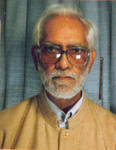 Mansur Hoda: (1930–2001) was born in a middle class Muslim family in eastern Indian state of Bihar. Mansur Hoda as a student, had worked as a research volunteer for the Intermediate Technology Group. After working for Indian Railway for 10 years, he joined Bihar government as Inspector of Factories. Mansur Hoda: (1930–2001) was born in a middle class Muslim family in eastern Indian state of Bihar. Mansur Hoda as a student, had worked as a research volunteer for the Intermediate Technology Group. After working for Indian Railway for 10 years, he joined Bihar government as Inspector of Factories.
Mansur Hoda was greatly influenced by E F Schumacher of Small Is Beautiful fame. Mansur Hoda was absolutely convinced by the Schumacher's concept of Intermediate Technology or Appropriate technology - something between the sickle and the combine harvester, the hoe and the tractor - as the only feasible solution to the problems of massive unemployment that haunted India and other developing countries.[1]
E. F. Schumacher in an article published in The Observer, had strongly advocated for the 'intermediate technologies' focusing on the need and skills possessed by the people of developing countries. He rejected the conventional aid policies which were based on trasfer of modern large-scale technologies to poor countries lacking technical skills and mass market for them. This article crated lots of interest and encouraged few enthusiasts like George McRobie, Alfred Latham-Koenig and Mansur Hoda along with E. F Schumacher to create an advisory centre to promote the use of labour intensive techonologies. In 1966, the ntermediate Technology Development Group (ITDG) - now known as Practical Action - was born.[2]
Read more...

Ernst Friedrich Schumacher "Fritz" (16 August 1911 – 4 September 1977) was an internationally influential economic thinker, statistician and economist in Britain, serving as Chief Economic Advisor to the UK National Coal Board for two decades.[1] His ideas became popularized in much of the English-speaking world during the 1970s. He is best known for his critique of Western economies and his proposals for human-scale, decentralized and appropriate technologies. According to The Times Literary Supplement, his 1973 book Small Is Beautiful: a study of economics as if people mattered is among the 100 most influential books published since World War II.[2] and was soon translated into many languages, bringing him international fame. Schumacher's basic development theories have been summed up in the catch-phrases Intermediate Size and Intermediate Technology. In 1977 he published A Guide For The Perplexed as a critique of materialist scientism and as an exploration of the nature and organization of knowledge. Together with long-time friends and associates like Professor Mansur Hoda, Schumacher founded the Intermediate Technology Development Group (now Practical Action) in 1966.
Early life
Schumacher was born in Bonn, Germany in 1911. His father was a professor of political economy. The younger Schumacher studied in Bonn and Berlin, then from 1930 in England as a Rhodes Scholar at New College, Oxford,[1] and later at Columbia University in New York City, earning a diploma in economics. He then worked in business, farming and journalism.[1]
Read more...
Ilya Prigogine (Russian: Илья́ Рома́нович Приго́жин, Ilya Romanovich Prigozhin) (25 January 1917 – 28 May 2003) was a Russian-born naturalized Belgian physical chemist and Nobel Laureate noted for his work on dissipative structures, complex systems, and irreversibility.
Biography

Prigogine was born in Moscow a few months before the Russian Revolution of 1917. His father, Roman (Ruvim Abramovich) Prigogine, was a chemical engineer at the Moscow Institute of Technology; his mother, Yulia Vikhman, was a pianist. Because the family was critical of the new Soviet system, they left Russia in 1921. They first went to Germany and in 1929, to Belgium, where Prigogine received Belgian citizenship in 1949.
Prigogine studied chemistry at the Free University of Brussels, where in 1950, he became professor. In 1959, he was appointed director of the International Solvay Institute in Brussels, Belgium. In that year, he also started teaching at the University of Texas at Austin in the United States, where he later was appointed Regental Professor and Ashbel Smith Professor of Physics and Chemical Engineering. From 1961 until 1966 he was affiliated with the Enrico Fermi Institute at the University of Chicago. In Austin, in 1967, he co-founded what is now called The Center for Complex Quantum Systems. In that year, he also returned to Belgium, where he became director of the Center for Statistical Mechanics and Thermodynamics.
Read more...
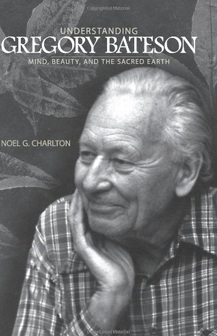
Gregory Bateson (9 May 1904 – 4 July 1980) was an English anthropologist, social scientist, linguist, visual anthropologist, semiotician and cyberneticist whose work intersected that of many other fields. He had a natural ability to recognize order and pattern in the universe. In the 1940s he helped extend systems theory/cybernetics to the social/behavioral sciences, and spent the last decade of his life developing a "meta-science" of epistemology to bring together the various early forms of systems theory developing in various fields of science. Some of his most noted writings are to be found in his books, Steps to an Ecology of Mind (1972) and Mind and Nature (1979). Angels Fear (published posthumously in 1987) was co-authored by his daughter Mary Catherine Bateson.
Biography
Bateson was born in Grantchester in Cambridgeshire, England on 9 May 1904 - the third and youngest son of [Caroline] Beatrice Durham and of the distinguished geneticist William Bateson. The younger Bateson attended Charterhouse School from 1917 to 1921, obtained a BA in biology at St. John's College, Cambridge in 1925, and continued at Cambridge from 1927 to 1929. Bateson lectured in linguistics at the University of Sydney in 1928. From 1931 to 1937 he was a Fellow of St. John's College, Cambridge, spent the years before World War II in the South Pacific in New Guinea and Bali doing anthropology. During 1936-1950 he was married to Margaret Mead[2]. At that time he applied his knowledge to the war effort before moving to the United States.
Read more...
Jay Wright Forrester (born July 14, 1918) is a pioneer American computer engineer, systems scientist and was a professor at the MIT Sloan School of Management. Forrester is known as the founder of System Dynamics, which deals with the simulation of interactions between objects in dynamic systems.
Biography
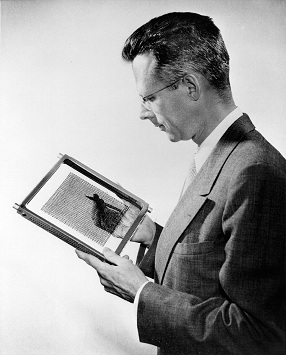 Forrester was born in 1918 on a cattle ranch near Anselmo, Nebraska, in the middle of the United States. His early interest in electricity was spurred, perhaps, by the fact that the ranch had none. While in high school, he built a wind-driven 12-volt electrical system using old car parts—it gave the ranch its first electric power.[1] After finishing high school, he had received a scholarship to go to the Agricultural College. Three weeks before enrolling, he realized a future of herding cattle in Nebraska winter blizzards had never appealed to him. So instead in 1936 he enrolled in the Engineering College at the University of Nebraska to study electrical engineering. As it turns out this study was about the only academic field with a solid, central core of theoretical dynamics.[2] Forrester was born in 1918 on a cattle ranch near Anselmo, Nebraska, in the middle of the United States. His early interest in electricity was spurred, perhaps, by the fact that the ranch had none. While in high school, he built a wind-driven 12-volt electrical system using old car parts—it gave the ranch its first electric power.[1] After finishing high school, he had received a scholarship to go to the Agricultural College. Three weeks before enrolling, he realized a future of herding cattle in Nebraska winter blizzards had never appealed to him. So instead in 1936 he enrolled in the Engineering College at the University of Nebraska to study electrical engineering. As it turns out this study was about the only academic field with a solid, central core of theoretical dynamics.[2]
After finishing the University in 1939 he went to the Massachusetts Institute of Technology, to become a research assistant and eventually spend his entire career. In his first year at MIT he was commandeered by Gordon S. Brown who was the pioneer in "feedback control systems" at MIT. During World War II his work with Gordon Brown was in developing servomechanisms for the control of radar antennas and gun mounts. This work was research toward an extremely practical end that ran from mathematical theory to the operating field. Experimental units were installed on the USS Lexington, and, when they stopped working, he volunteered to go to Pearl Harbor in 1942. He fixed the problem when the ship sailed off-shore during the invasion of Tarawa.[2]
Read more...
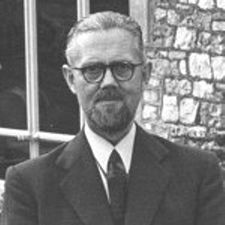 W. Ross Ashby (London, 6 September 1903 – 15 November 1972) was an English psychiatrist and a pioneer in cybernetics, the study of complex systems. His first name was not used: he was known as Ross Ashby. W. Ross Ashby (London, 6 September 1903 – 15 November 1972) was an English psychiatrist and a pioneer in cybernetics, the study of complex systems. His first name was not used: he was known as Ross Ashby.
His two books, Design for a brain and An introduction to cybernetics, were landmark works. They introduced exact, logical, thinking to the nascent discipline, and were highly influential.
Biography
William Ross Ashby was born in 1903 in London, where his father was working at an advertising agency.[1] From 1917 to 1921 William studied at the Edinburgh Academy in Scotland, and from 1921 at Sidney Sussex College, Cambridge, where he received his B.A. in 1924 and his M.B. and B.Ch. in 1928. From 1924 to 1928 he worked at the St. Bartholomew's Hospital in London. Later on he also received a Diploma in Psychological Medicine in 1931, and an M.A. 1930 and M.D. from Cambridge in 1935.
Ross Ashby started working in 1930 as a Clinical Psychiatrist in the London County Council. From 1936 until 1947 he was a Research Pathologist in the St Andrew's Hospital in Northampton in England. From 1945 to 1947 he served in India where he was a Major in the Royal Army Medical Corps.
When he returned to England he served as Director of Research of the Barnwood House Hospital in Gloucester from 1947 until 1959. For a year he was Director of the Burden Neurological Institute in Bristol. In 1960 he went to the United States and became Professor, Depts. of Biophysics and Electrical Engineering, University of Illinois at Urbana-Champaign, until his retirement in 1970.[2]
Ashby was president of the Society for General Systems Research from 1962 to 1964. He became a fellow of the Royal College of Psychiatry in 1971.
On March 4–6, 2004, a W. Ross Ashby centenary conference was held at the University of Illinois at Urbana-Champaign to mark the 100th anniversary of his birth. Presenters at the conference included Stuart Kauffman, Stephen Wolfram and George Klir.[3] In February 2009 a special issue of the International Journal of General Systems was specifically devoted to Ashby and his work, containing papers from leading scholars such as Klaus Krippendorff, Stuart Umpleby and Kevin Warwick.[4]
Work
Despite being widely influential within cybernetics, systems theory and, more recently, complex systems, he is not as well known as many of the notable scientists his work influenced including Herbert Simon, Norbert Wiener, Ludwig von Bertalanffy, Stafford Beer and Stuart Kauffman.[5]
Journal
Ashby kept a journal for over 44 years in which he recorded his ideas about new theories. He started May 1928, when he was medical student at St. Bartholomew's Hospital in London. Over the years he wrote down a series of 25 volumes totaling 7,400 pages. In 2003 these journals were given to The British Library, London, and since 2008, they were made available online as The W. Ross Ashby Digital Archive.[6]
Cybernetics
Ross Ashby was one of the original members of the Ratio Club, a small informal dining club of young psychologists, physiologists, mathematicians and engineers who met to discuss issues in cybernetics. The club was founded in 1949 by the neurologist John Bates and continued to meet until 1958.
Earlier, in 1946, Alan Turing wrote a letter[7] to Ashby suggesting he use Turing's Automatic Computing Engine (ACE) for his experiments instead of building a special machine. In 1948 Ashby made the Homeostat.[8]
Variety
In An Introduction to Cybernetics Ashby formulated his Law of Requisite Variety [9] stating that "variety absorbs variety, defines the minimum number of states necessary for a controller to control a system of a given number of states." This law can be applied for example to the number of bits necessary in a digital computer to produce a required description or model.
In response Conant (1970) produced his so called "Good Regulator theorem" stating that "every Good Regulator of a System Must be a Model of that System".[10]
Stafford Beer applied Variety to found management cybernetics and the Viable System Model. Working independently Gregory Chaitin followed this with algorithmic information theory.
See also
Publications
- Books
- Articles, a selection
- 1940. "Adaptiveness and equilibrium". In: J. Ment. Sci. 86, 478.
- 1945. "Effects of control on stability". In: Nature, London, 155, 242-243.
- 1946. "The behavioural properties of systems in equilibrium". In: Amer. J. Psychol. 59, 682-686.
- 1947. "Principles of the Self-Organizing Dynamic System". In: Journal of General Psychology (1947). volume 37, pages 125–128.
- 1948. "The homeostat". In: Electron, 20, 380.
- 1962. "Principles of the Self-Organizing System". In: Heinz Von Foerster and George W. Zopf, Jr. (eds.), Principles of Self-Organization (Sponsored by Information Systems Branch, U.S. Office of Naval Research). Republished as a PDF in Emergence: Complexity and Organization (E:CO) Special Double Issue Vol. 6, Nos. 1-2 2004, pp. 102–126.
- About W. Ross Ashby
References
- ^ Biography of W. Ross Ashby The W. Ross Ashby Digital Archive, 2008.
- ^ Autobiographical summary, taken from Ashby's own notes, made about 1972.
- ^ W. Ross Ashby Centenary Conference The W. Ross Ashby Digital Archive, 2008
- ^ International Journal of General Systems
- ^ Cosma Shalizi, W. Ross Ashby web page, 1999.
- ^ W. Ross Ashby Journal (1928-1972) The W. Ross Ashby Digital Archive, 2008.
- ^ Alan Turing letter The W. Ross Ashby Digital Archive, 2008.
- ^ Java applet simulation by Dr Horace Townsend
- ^ (Ashby 1956)
- ^ Int. J. Systems Sci., 1970. vol 1, No. 2 pp89-97
External links
- The W. Ross Ashby Digital Archive includes an extensive biography, bibliography, letters, photographs, movies, and fully-indexed images of all 7,400 pages of Ashby's 25 volume journal.
- Homepage of William Ross Ashby with a short text from the Encyclopædia Britannica Yearbook 1973, and some links.
- Asaro, Peter M. (2008). "From Mechanisms of Adaptation to Intelligence Amplifiers: The Philosophy of W. Ross Ashby," in Michael Wheeler, Philip Husbands and Owen Holland (eds.) The Mechanical Mind in History, Cambridge, MA: MIT Press, pp. 149–184.
- W. Ross Ashby web page by Cosma Shalizi, 1999.
- W. Ross Ashby (1956): An Introduction to Cybernetics, (Chapman & Hall, London): available electronically , Principia Cybernetica Web, 1999
- The Law of Requisite Variety in the Principia Cybernetica Web, 2001.
- 159 Aphorisms from Ashby and further links at the Cybernetics Society
- W. Ross Ashby, Cybernetics and Requisite Variety (1956) from An Introduction to Cybernetics
- W. Ross Ashby, Feedback, Adaptation and Stability (1960) from Design for a Brain
- What is Cybernetics? Livas short introductory videos on YouTube
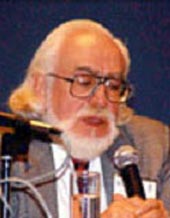 Dr. Hasan Özbekhan (1921 – February 12, 2007) was a Turkish American systems scientist, cyberneticist, philosopher and planner who was Professor Emeritus of Management at the Wharton School of the University of Pennsylvania. He applied the field-of-systems theory to global problems, helped inspire the group of planners, diplomats, scientists and academics who came together as the Club of Rome.[1] Dr. Hasan Özbekhan (1921 – February 12, 2007) was a Turkish American systems scientist, cyberneticist, philosopher and planner who was Professor Emeritus of Management at the Wharton School of the University of Pennsylvania. He applied the field-of-systems theory to global problems, helped inspire the group of planners, diplomats, scientists and academics who came together as the Club of Rome.[1]
Biography
Hasan Özbekhan was born in Turkey in 1921, into a diplomatic family. He studied at the Lycée Chateaubraind in Rome, and then studied Law and Political and Administrative sciences at the Faculte de Droit and the École Libre des Sciences Politiques in Paris, and his graduate studies at the London School of Economics. He undertook his postgraduate work at the University of Cambridge after being elected to the Leverhume Fellowship.[2]
In the 1960s Ozbekhan worked as management consultant to large multinational corporations. The work he did for governments includes Science Policy design for Turkey and a large study for the French Government analyzing the nature of present events that, most probably, will shape the future of Paris. The recommendations derived from these analyses currently constitute the basis of the policies adopted by the French Government with respect to the city's long-term development.[2] From 1963 to 1969 he was principal scientist and director of planning at the System Development Corporation, a military research group and software development company in Santa Monica, California.[1]
Read more...
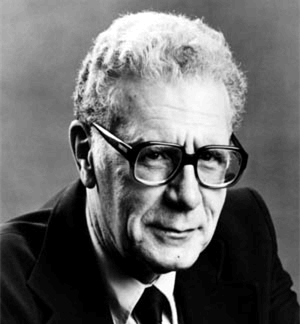 Russell Lincoln Ackoff (12 February 1919 – 29 October 2009) was an American organizational theorist, consultant, and Anheuser-Busch Professor Emeritus of Management Science at the Wharton School, University of Pennsylvania. Ackoff was a pioneer in the field of operations research, systems thinking and management science. Russell Lincoln Ackoff (12 February 1919 – 29 October 2009) was an American organizational theorist, consultant, and Anheuser-Busch Professor Emeritus of Management Science at the Wharton School, University of Pennsylvania. Ackoff was a pioneer in the field of operations research, systems thinking and management science.
Biography
Russell L. Ackoff was born in 1919 in Philadelphia to Jack and Fannie (Weitz) Ackoff.[1] He received his bachelor degree in architecture at the University of Pennsylvania in 1941. After graduation, he taught at Penn for one year as an assistant instructor in philosophy. From 1942 to 1946, he served in the U.S. Army. He returned to study at the University of Pennsylvania, where he received his doctorate in philosophy of science in 1947 as C. West Churchman’s first doctoral student.[2] He also received a number of honorary doctorates, from 1967 and onward.
From 1947 to 1951 Ackoff was assistant professor in philosophy and mathematics at the Wayne State University. He was associate professor and professor of operations research at Case Institute of Technology from 1951 to 1964. In 1961 and 1962 he was also visiting professor of operational research at the University of Birmingham. From 1964 to 1986 he was professor of systems sciences and professor of management science at the Wharton School at the University of Pennsylvania.
Nicholson and Myers (1998) report that, in the 1970s and 1980s, the Social Systems Sciences Program at the Wharton School was "noted for combining theory and practice, escaping disciplinary bounds, and driving students toward independent thought and action. The learning environment was fostered by distinguished standing and visiting faculty such as Eric Trist, C. West Churchman, Hasan Ozbekhan, Thomas A. Cowan, and Fred Emery".[3]
Read more...
|
|



 Biographies
Biographies


 Mansur Hoda: (1930–2001) was born in a middle class Muslim family in eastern Indian state of Bihar. Mansur Hoda as a student, had worked as a research volunteer for the Intermediate Technology Group. After working for Indian Railway for 10 years, he joined Bihar government as Inspector of Factories.
Mansur Hoda: (1930–2001) was born in a middle class Muslim family in eastern Indian state of Bihar. Mansur Hoda as a student, had worked as a research volunteer for the Intermediate Technology Group. After working for Indian Railway for 10 years, he joined Bihar government as Inspector of Factories.


 Forrester was born in 1918 on a cattle ranch near Anselmo, Nebraska, in the middle of the United States. His early interest in electricity was spurred, perhaps, by the fact that the ranch had none. While in high school, he built a wind-driven 12-volt electrical system using old car parts—it gave the ranch its first electric power.
Forrester was born in 1918 on a cattle ranch near Anselmo, Nebraska, in the middle of the United States. His early interest in electricity was spurred, perhaps, by the fact that the ranch had none. While in high school, he built a wind-driven 12-volt electrical system using old car parts—it gave the ranch its first electric power. W. Ross Ashby (London, 6 September 1903 – 15 November 1972) was an English psychiatrist and a pioneer in cybernetics, the study of
W. Ross Ashby (London, 6 September 1903 – 15 November 1972) was an English psychiatrist and a pioneer in cybernetics, the study of  Dr. Hasan Özbekhan (1921 – February 12, 2007) was a Turkish American systems scientist,
Dr. Hasan Özbekhan (1921 – February 12, 2007) was a Turkish American systems scientist,  Russell Lincoln Ackoff (12 February 1919 – 29 October 2009) was an American organizational theorist, consultant, and Anheuser-Busch Professor Emeritus of Management Science at the Wharton School, University of Pennsylvania. Ackoff was a pioneer in the field of
Russell Lincoln Ackoff (12 February 1919 – 29 October 2009) was an American organizational theorist, consultant, and Anheuser-Busch Professor Emeritus of Management Science at the Wharton School, University of Pennsylvania. Ackoff was a pioneer in the field of 

